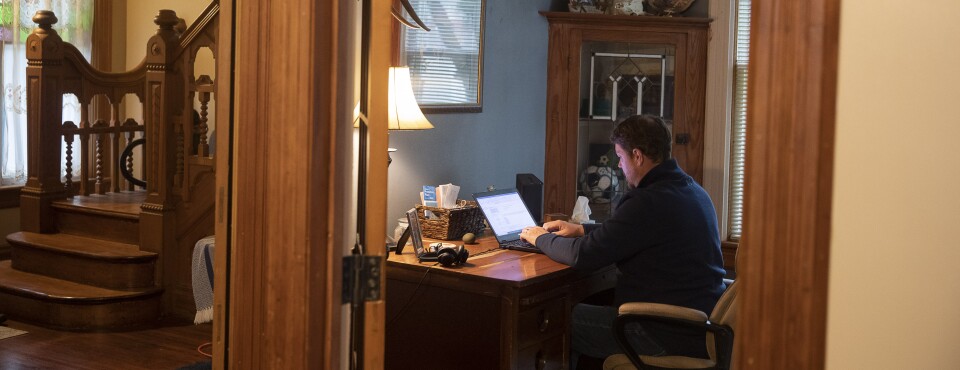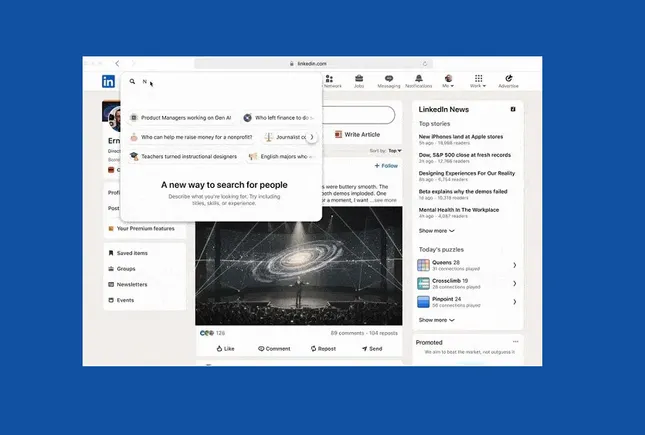Careers
Careers
[ follow ]
#career-transition #remote-work #layoffs #workplace-culture #recruiting #leadership #linkedin #hiring #networking
fromSlate Magazine
1 day agoMy Career Was Going So Well. One Social Media Post Ruined Everything.
I grew up in a stifling conservative Midwestern community. In spite of that, I managed to escape, first to a mediocre liberal arts college and then, after making the most of my time there, to a top-tier doctoral program. Subsequently, I worked my way up from position to position in my field until I obtained my dream job leading a prestigious organization.
Careers
Careers
fromFortune
1 day agoHalf of workers are 'revenge quitting' and walking out on their jobs without notice-and the majority are loyal, longtime staff | Fortune
Workers increasingly quit abruptly without notice — 'revenge quitting' driven mainly by toxic culture, poor management, and feeling undervalued rather than low pay.
fromwww.theguardian.com
2 days agoFriends end up blocking you': Northwestern Mutual sold college grads a dream job. They left in ruin and debt
Northwestern Mutual likes to think of itself as a storied American institution offering specialized financial advice. The 168-year-old financial giant, ranked 109 on the Fortune 500, and regularly anointed one of the World's Most Admired Companies by the magazine, describes its financial advisers as expert listeners or a trusted partner who helps you continue to reach goal after goal. It also tops Forbes's list of Best Employers for New Grads,
Careers
fromBusiness Insider
1 day agoUkrainian security source says Russia reacted to an attack by firing missiles into its own buildings
Russia fired surface-to-air missiles into its own residential buildings while responding to a large Ukrainian attack against an oil terminal on the Black Sea, a security source told Business Insider on Tuesday. A source in the Security Service of Ukraine said that Kyiv attacked the port city of Novorossiysk, Russia's second-largest oil export center and a hub for its Black Sea Fleet, in the latest strike targeting the country's energy sector.
Careers
fromBusiness Insider
1 day agoRussian infiltration teams are exploiting bad weather to sneak past Ukrainian lines
Lt. Col. Yurii Myronenko, Ukraine's deputy minister of defense for innovation, said that drones are responsible for strikes on roughly 90% of all targets struck on the battlefield and have made large-scale armor assaults extremely challenging. But drones alone are not enough to hold the line and stop the enemy from breaking through, he said. Dense fog and other inclement weather provide ideal cover for Russian infiltration tactics.
Careers
fromLondon Business News | Londonlovesbusiness.com
2 days agoBrits scramble for festive work as searches for Christmas temp jobs surge - London Business News | Londonlovesbusiness.com
New research from The Accountancy Partnership has revealed that there was a 23% increase in Google searches for the term 'Christmas temp jobs' this September compared to September 2024. Typically, searches for this rise over October and November, showing that Brits are looking to secure festive income earlier than ever. The study also shows a dramatic long-term rise in job-seeking behaviour around the festive period.
Careers
fromBusiness Insider
2 days agoThe real reason the job market is totally broken
In July 2024, Magdalena Robinson was laid off from her job as a vice president of talent acquisition at a media agency. The news came as a shock - by all accounts she was doing well - but she saw a silver lining: Maybe it was finally time for a career break. She took the rest of the year off, soaking in the extra time with her husband and teenage daughter. Then she started applying for jobs in January.
Careers
fromBusiness Insider
2 days agoUkraine's special ops forces say they just scored a battlefield first: taking out a Russian helicopter with a 'deep strike' drone
Ukraine's special operators said Saturday they took down a Russian Mi-8 helicopter with a long-range "deep strike" drone for the first time. The update didn't say where it happened, but it stressed the significance. They described the move as "changing the rules of the game: now we hunt!" Video released by Ukraine's Special Operations Forces appears to be footage from the drone as it flew over an enemy helicopter, drawing steadily closer before the clip cuts off.
Careers
Careers
fromBusiness Insider
3 days agoA good resume and cover letter are no longer enough. These are the creative ways job seekers are getting to the front of the line.
Unconventional, attention-grabbing job-search tactics are increasingly necessary to succeed in a tight hiring market dominated by the 'Great Freeze.'
fromBusiness Insider
3 days ago'Entitled,' 'complacent,' and 'sloppy': Inside the workplace tension at the world's largest HR organization
On September 11, a Marilyn Monroe impersonator sang a sultry rendition of "Happy Birthday" to an executive at the Virginia headquarters of the Society for Human Resource Management. The brief performance, which took place in a conference room with about 75 employees, came after remarks honoring the 24th anniversary of the 2001 terror attacks. Two former staffers who were present at the gathering, recordings of which were reviewed by Business Insider, said it was uncomfortable to see - and not just because it was sexually suggestive.
Careers
fromHer Campus
4 days agoThe Perfect Resume 101: The Ultimate Guide to Landing Your Dream Job
Between trying to ensure your layout is right, choosing the accolades you want to include, and even selecting the right font, it's best to avoid putting unnecessary stress on yourself when it comes to creating your resume. But look at it from this perspective: your resume is your first impression, a way to really review the accomplishments you have made, and a way to really show out and make a recruiter say, "I need to hire this person."
Careers
fromFast Company
5 days agoUs vs. them: How working parents are viewed in the workplace
And I am not talking about the bags under your eyes or the six cups of coffee needed to get through the day. It usually happens at 4:59 p.m. when they start to pack up so they can make it to daycare or a school recital or any number of obligations parents have. As they slip out of the open-plan cubicle maze, a child-free colleague glances over and thinks (or sometimes says out loud), "Must be nice."
Careers
fromFast Company
5 days ago3 signs that your future boss might be a bad boss
During those interviews, no one ever offered me a glass of water. Not the recruiter who greeted me. Not the other individuals who interviewed me. And no, not my future boss. I remember that at some point I had to use the bathroom. My future boss seemed annoyed that I asked where the ladies' room was. I scurried into the bathroom quickly, not wanting to be late for the next interview.
Careers
fromMoneywise
5 days agoFlorida nurse supercommutes to California's Bay Area to make 3 times as much as she could locally. Is her bicoastal lifestyle a good idea?
Take Memwanesha Daniels, a self-described "bicoastal nurse" who supercommutes from Jacksonville, Fla., to the San Francisco Bay Area. In a recent CNBC report, Daniels says that by supercommuting to the Bay Area, she is able to make three times what she would make in Florida (1). "It's very lucrative," she told CNBC. "This is a retirement plan for me." Daniels has also acquired an online following and appears to be a budding influencer.
Careers
Careers
fromFortune
5 days agoHow to know if you're an A, B, or C player, according to an elite recruiter who's interviewed over 50,000 executives | Fortune
Top performers pursue challenge and high-stakes growth; mid-level performers seek recognition and avoid exposure; low performers prioritize comfort, reducing organizational performance.
from24/7 Wall St.
5 days agoBrilliant Retirement Tips From Jamie Dimon You Should Not Ignore
Jamie Dimon is the CEO of JPMorgan Chase and a great business icon from which to learn. No matter where you are in your career (an early 30-something seeking Jamie Dimon advice or an older professional looking for retirement wisdom), Jamie Dimon offers appropriate insights for everyone. If you're a 60-something reflecting on your career or heading toward retirement, here are five Jamie Dimon quotes every 60-year-old needs to hear.
Careers
fromBusiness Insider
5 days agoEx-military trainer reveals the hardest lesson to teach Ukrainian soldiers: when to stop shooting and save bullets
Maj. Maguire, a UK military officer who spoke to Business Insider on the condition that only his rank and last name be used, said that when he was working with the UK-led training program for Ukrainian soldiers, troops in training had a "massive tendency" to unleash everything at opposing forces. The attitude, he said, was that if you see a Russian, "you shoot them," and you don't stop until they're dead or they surrender.
Careers
Careers
fromLondon Business News | Londonlovesbusiness.com
6 days agoSix million Brits say they hate their job - London Business News | Londonlovesbusiness.com
Many UK workers report dissatisfaction and perceptions of unfair pay despite high salaries in some sectors, with IT showing the highest pay and job satisfaction.
Careers
fromLondon Business News | Londonlovesbusiness.com
6 days agoFree tool to generate professional cover letter drafts - London Business News | Londonlovesbusiness.com
Use a free cover letter generator with a suitable template, accurate contact details, and job-specific tailoring to produce a polished, effective cover letter quickly.
fromBackyard Garden Lover
1 week ago16 Jobs Perfect For Retirees They Can Do At Home
Millions of Americans aged 65 and older are still professionally active, proving that retirement can be a new chapter filled with satisfying work opportunities. Many retirees seek work-from-home options that offer flexibility, financial security, and the chance to put their valuable experience back to work. Remote work allows retirees to continue contributing to society while enjoying a relaxed work-life balance (and even travel if they'd like!).
Careers
fromFast Company
1 week agoHow to surmount a 'promotion plateau'
Typically, a promotion plateau results from the organizational structure of a business with barriers of advancement: hierarchy, red tape, poor structural systems in place, even budget constraints. In some cases, an employee's apathy and lack of transferable skills due to these structural challenges can affect the possibility of being promoted. Whatever the reason, "if you cannot see a clear path for advancement in your organization, you may be at a promotion plateau," Sherman says.
Careers
Careers
fromLondon Business News | Londonlovesbusiness.com
1 week agoContract staffing grows as employers navigate market uncertainty - London Business News | Londonlovesbusiness.com
Contract hiring is increasing while permanent hiring stabilises, driving growing demand for flexible staffing and continued reliance on contingent workers.
fromFast Company
1 week agoWhy entry-level workers are more hopeful than their bosses right now
Glassdoor's latest numbers show something many leaders might not expect: Confidence is rising among those at the beginning and middle of their careers. Entry-level confidence ticked up 1.9 points and mid-level roles rose 2.3. After several years defined by layoffs, volatility, and reorganization, you'd think this group would be the most anxious. But instead, they're slowly stabilizing-and in many cases, feeling more empowered.
Careers
Careers
fromBusiness Insider
1 week agoHow to land a consulting job these days, according to 'Case in Point' author Marc Cosentino
Harvard career counseling revealed top students needed confidence, independent thinking, and clear communication, prompting targeted coaching and guides for consulting recruitment.
Careers
fromBusiness Insider
1 week agoUkrainian drone teams overcame dense fog by using ground robots to spot Russia's advances, brigade says
The 93rd Separate Rifle Brigade used uncrewed ground vehicles to detect Russian troops in dense fog, enabling FPV drones to strike advancing forces near Pokrovsk.
fromTVovermind
1 week agoLinkedIn Post Goes Viral For Pointing Out That How You Phrase Your Salary Expectations Gives A Different Impression To The Recruiter
Negotiating salaries is hard and awkward and most people hate it as it's a necessary evil. Unless you like volunteer work. But, luckily for everyone, it doesn't have to be a should I rip the band aid off quickly, or take my time and peel it? sort of situation. Maybe more of a let's soak it in water and then take it off with more ease. There's a neat language tactic people can use to assert a grounded stance on where they think their salary should be, providing more legitimacy to their request and making it a tad bit harder for employers to low-ball them.
Careers
fromsilive
1 week agoN.Y. job postings on Staten Island: Here are the salaries for November open positions
STATEN ISLAND, N.Y. - The state of New York has posted several new position openings on Staten Island in the month of November, with varying levels of experience and education required. Salaries range from $55,537 to $125,413. New York state provides careers that touch every part of public life - including education, environmental conservation, and health care. The state employs people of all ages, backgrounds, and education levels - from first responders to engineers, nurses, research scientists, and plow drivers.
Careers
Careers
fromLondon Business News | Londonlovesbusiness.com
1 week agoTired of not getting that promotion? Consider this - London Business News | Londonlovesbusiness.com
Track measurable achievements and proactively pursue external advancement when internal promotion stalls to secure deserved raises and career growth.
fromBusiness Insider
1 week agoThe top recruiting firms in the US
Business Insider teamed up with Plant-A Insights, a leading insights and technology company that publishes business rankings in cooperation with world-class media brands, to find the 750 top recruiting firms in America. The list covers firms that can help find employees from temp services to the C-suite, in industries from tech to finance to healthcare, based all across the country.
Careers
Careers
fromFortune
1 week agoThis 'hidden' career path is in dire need of more workers-and it can pay Gen Z over $300,000 with no degree required | Fortune
A severe shortage of aviation maintenance technicians will require about 416,000 new hires by 2034, threatening aircraft maintenance capacity and operational reliability.
fromFast Company
1 week ago5 signs you're working for a performative manager (and how to outsmart them)
Every workplace seems to have one. A manager who goes silent for days, then suddenly reappears in the team chat the moment senior leadership checks in. They'll swoop in to take credit for the work they hadn't touched, and say, "Oh yes, we've been addressing that." This type of boss shows up when there's an audience, then vanishes as soon as the higher-ups leave. I've started calling them the performative manager, because that's exactly what they are.
Careers
fromBusiness Insider
1 week agoRussia's unjammable drones are now long-range, and Ukraine's logistics are in danger
Russia has begun using long-range, jam-proof drones controlled by fiber-optic cables to threaten Ukraine's logistics, a senior government official told Business Insider. Mykhailo Fedorov, the first deputy prime minister of Ukraine and its minister of digital transformation, said that Russia is now fielding fiber-optic drones with a range of 50 kilometers (31 miles), which appears to be the first official confirmation from Kyiv that Moscow is using these weapons in combat. That 50-kilometer range exceeds what most known fiber-optic drones can achieve on the battlefield.
Careers
fromBusiness Insider
2 weeks agoI quit Deloitte after burning out. Now I've reshaped how I view success.
I joined Deloitte after graduate school in 1999 as a senior consultant. I'd been recruited out of the Harvard Kennedy School and thought I'd spend a year or two in the private sector before entering politics or policy in DC. Twenty-one years later, I was still there and had become a partner. I was at the height of my career - then my health caused me to come crashing down.
Careers
fromBusiness Insider
2 weeks agoIBM's chief scientist has advice for entry-level engineers: Think beyond Big Tech
"Don't just go for the standard 'I'm going to go and work for Google, Microsoft, IBM,'" Ruchir Puri told Business Insider. Puri, who has spent over three decades at IBM, said that as AI reshapes every industry, software engineers are needed across all sectors - whether that's transportation, manufacturing, or retail. He said job seekers should widen their search "beyond a narrow set of technology companies" and also consider the "massive enterprise landscape."
Careers
fromPsychology Today
2 weeks agoNon-Parents, the Free Agents of Adulthood
Finally, a descriptor that just might work. Finding terms to describe those of us who don't have kids is challenging. We're usually referred to as what we're not (non-moms, unparents, people without kids). Cumbersome, clunky, and not very respectful. Beginning with Major League Baseball in the mid-1970s, free agency gave professional athletes the flexibility to develop their careers after their contracts expired. The practice gradually spread to other professional sports and is now well-accepted by sports organizations and fans around the world.
Careers
Careers
fromBusiness Insider
2 weeks agoThe former CEO of DocuSign says he promotes people based on 3 factors, and an Ivy League degree isn't one of them
Ivy League degrees do not determine promotions; promotion decisions focus on employees' demonstrable skills, ego management, and sustained work ethic.
[ Load more ]













